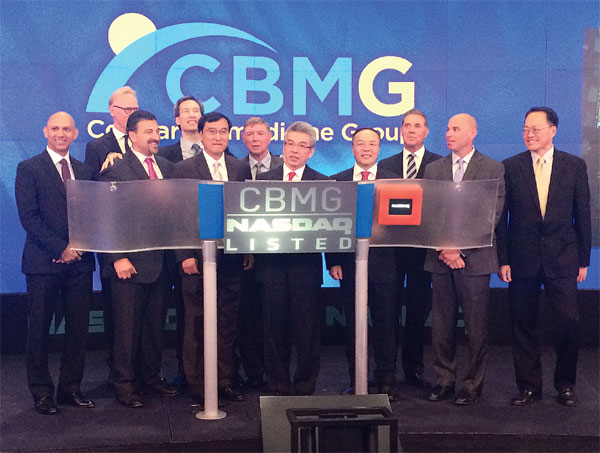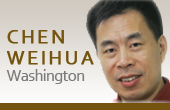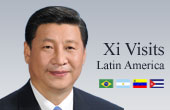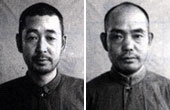Chinese firm rings NASDAQ bell
By Amy He in New York (China Daily USA) Updated: 2014-08-19 10:51Biotech group just went public two months ago
China-based and NASDAQ-listed biotech company Cellular Biomedicine Group rang the closing bell at the midtown stock exchange on Monday, having just gone public at the market two months earlier.
William Cao, the CEO of Cellular Biomedicine Group, told China Daily that US and Chinese biotechnology and pharmaceutical companies can work together to capitalize on the growing reliance on immune cell therapy.
|
William Cao (center), CEO of Cellular Biomedicine Group (CBMG), and CFO Tony Liu (fourth from right) ring the closing bell at the NASDAQ on Aug 18 in New York. Elizabeth Wu / For China Daily |
"[American pharmaceutical] companies have decades of experience in developing and formulating better therapies. They've made things more user-friendly," Cao said. "Just by guessing the size [of companies], there will be a lot of resources made available to Chinese companies for further improving the versions of the therapies. The US and China are definitely a perfect match."
Cellular Biomedicine Group (CBMG) is a biotechnology company that focuses on cell-based products for disease treatment in China and is working on expanding into the US.
"The China market - we definitely want it. We are a Chinese company, so we want the China market," Cao said. "That's equally important to the US companies."
The US is a technology-driven country, so if any drugs go on trial or data is collected about potential drugs, it will bring a lot of value to Chinese companies, he added.
China and other East Asian countries have been particularly receptive to immune cell therapy, which involves the process of taking cells out of a patient, processing it, and then delivering it back into a patient. Founded in 2009, Shanghai-based CBMG focuses on developing medication and therapies for those suffer from cancer and degenerative diseases such as osteoarthritis.
"I think Asian patients might be more open to autologous" - cells obtained from an individual - "in therapy. In traditional Chinese medicine, it's common for patients to [use the body as a] natural source of therapy, so for the Chinese patients, they are very willing to take cell therapy," he said.
In the US, however, modern medicine has historically been molecular-based. "If the mechanism action is not clear, then the drug cannot go to market. You have to have it clear - which molecule hits which targets and which genes - and it takes longer time for the scientist in development stage to figure out which molecule is useful, what the side effects are and so on," Cao said.
But a growing trend has emerged recently with patients and doctors turning to immune cell therapy and many US pharmaceutical companies have jumped on the movement as the firms search for potential discoveries to add to their pipelines.
Many of the new technologies are coming from China. Cao and CBMG's Chief Financial Officer Tony Liu said that Chinese companies like CBMG can add value to US companies that are looking for opportunities in China. With more than 3 million new patients in China being diagnosed with cancer every year and 60 million patients with osteoarthritis-a big disease area-the China market is the global market, Cao said.
"[US companies and their] technology, operations, scale, they can all come to China where we have connections with local hospitals" as well as research on the local market, Liu said.
"That's exactly what we're looking for: a partnership," Cao said. "The US pharmaceutical companies have a hunger for new pipelines in the big disease areas - [osteoarthritis] is a huge disease area - but there is no pipeline for them. This is the opportunity for them to partner with CBMG and conduct clinical trials simultaneously in the US."
amyhe@chinadailyusa.com











